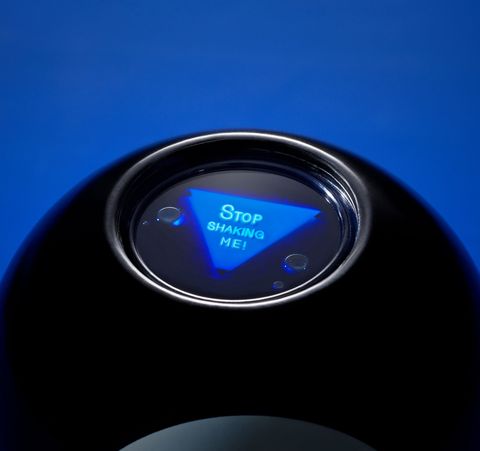
After a year of staying mostly at home, I’ve come to understand certain things about mice. Mice hate open spaces. That’s why they hunker down inside walls and cabinets instead of lounging on the sofa. Exposed environments are unpredictable, which makes those spaces seem dangerous.
Unsurprisingly, when a team of researchers placed mice in an open portion of a maze, the rodents scurried for an exit, and neurons provoked by anxiety started popping off like fireworks. “The more anxious the mouse, the more the neurons were activated, and the more likely they were to try to flee,” says Mazen Kheirbek, Ph.D., an assistant professor of psychiatry at the University of California, San Francisco and one author of the study.
I feel for those jittery mice. I have bolted on two occasions in the past month alone—once from the grocery store, when a woman in the produce section unleashed a voluminous sneeze, and again when I was hiking and heard yipping and rustling in some nearby brush. Squirrel? Coyote? Mountain lion? Faced with uncertainty, I behaved like your average risk-averse rodent. I fled.

Uncertainty is one of the most insidious stressors humans (and other mammals) face. Studies of both people and rodents have shown that it’s less stressful to know that you’re about to receive an electric shock than to think you might get one. Uncertainty disrupts your ability to forecast what will happen in the future, making you anxious, hypervigilant, and more likely to overreact to upsetting or worrisome news or events.
“Our brains are pattern makers, but we can’t make a pattern out of what’s happening now. We haven’t lived through a pandemic, nor have most of us lived through this level of political or social divisiveness,” says Christine Carter, Ph.D., a sociologist at UC Berkeley’s Greater Good Science Center. As a result, “we perceive ambiguity about the future as a threat.” Which explains why the times we’re living in are so damn agonizing. In the American Psychological Association’s 2020 Stress in America survey, 65 percent of respondents reported feeling uncertainty-related stress.
Why uncertainty keeps some people in a perpetual state of jumpiness and others, well, not is partly due to personal history and biology and partly about coping skills. “Your temperament and prior experiences affect how well you’re able to handle uncertainty,” says Carter. “If you’ve been dealing with discrimination all your life, or you’ve suffered other types of trauma, you’ll have fewer emotional resources available to cope with the challenges we’re all facing right now.” It won’t be as easy for you as it might be for others. Yet no matter what your background, you can build your tolerance for uncertainty, even through chaos, protect yourself against stress surges, and end up more resilient.
Here’s your four-step training plan.

1) Get stability by streamlining information
Googling everything about a complex topic offers an illusion of control, but overresearching can compound stress. Ambiguous or conflicting information undermines certainty, says Ellie Kyung, Ph.D., an associate professor of marketing at the Tuck School of Business at Dartmouth College. Before you start searching, decide on the questions you need answered. Bookmark a handful of trusted sources—institutions or media outlets that have a long history of reliability, truthfulness, and transparency—and do your research there. Same thing goes for getting info from, say, your doctor. When news of the COVID vaccines first came out, Kyung asked an immunologist friend to explain them. “She was telling me about RNA and different kinds of proteins, and I felt completely overwhelmed,” says Kyung. “So I thought about what I really needed to know. I didn’t need to understand the biology. I just needed the bottom line.” Now that you’ve saved yourself from vitality-sucking rabbit holes, you have some energy back. Energy to act on what you know, rather than just worry about it.
2) Actively surrender to get some control
When Christina Koch, a NASA astronaut, began her 11-month mission on the International Space Station in March 2019, she had no idea how long she was going to be in space. “I reminded myself frequently that at the end of the mission I wanted to be proud of how I handled it and what I contributed,” she says. “So instead of worrying about how long I’d be there, I focused on accepting the fact that the time frame was out of my control.” Science bears her out: Accepting your situation and not fighting against it and not letting it frustrate you signals to your brain that you’re not under threat, says Carter, the Berkeley sociologist. If acceptance totally doesn’t come naturally to you, Carter knows your pain. Here’s how she learned to get there: “I sit quietly and visualize the circumstances I’m struggling with. Then I say to myself, ‘I surrender resistance to this circumstance.’ I also notice how I’m feeling—exhausted, afraid, unfocused, whatever…Acknowledge and accept that.” By seeing what’s happening and not wasting energy on being stuck, you’re also practicing the superpower of being honest with yourself.
3) Appreciate the unfamiliar
“For most situations, we rely largely on rational, analytical thinking,” says Leonard Mlodinow, Ph.D., a theoretical physicist and the author of Elastic: Unlocking Your Brain’s Ability to Embrace Change. “We’ve all had to learn to adapt everywhere we turned, and that required elastic thinking, which is more emotional and intuitive and helps us cope with change.” Exposing yourself to unfamiliar things, like different art, music, and food, helps foster elastic thinking—which in turn powers up your resilience for when you meet all kinds of challenges.
4) Stay moving
So remember those skittish mice with the fired-up anxiety neurons? When scientists used a new genetic trick that allowed them to turn down the activity of those particular neurons and plopped them back into the scary open space, they were less anxious and more interested in exploring the situation. Instead of genetic hacking, try exercise, which triggers the growth of new brain cells that help keep anxiety neurons from being in control. Just how you like it.
Source: Read Full Article


